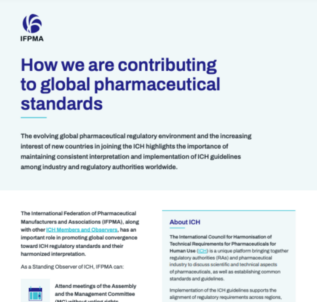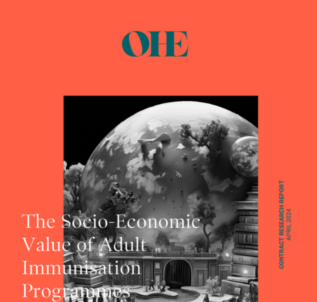Statement Delivered at the 23rd WHO Expert Committee Meeting on the Selection and Use of Essential Medicines
IFPMA welcomes the opportunity to address this meeting of the Essential Medicines List (EML) Expert Committee, and we take this occasion to also congratulate the World Health Organization (WHO) for the progress made over 44 years in the iterations of the Essential Medicines List.
IFPMA represents over 30 leading global biopharmaceutical companies and 50 national associations employing over 2 million people worldwide. IFPMA members are dedicated to researching, developing and manufacturing both innovative and established treatments for patients worldwide. The increasing number of products placed on the EML demonstrates the critical role played by the biopharmaceutical industry in creating therapies that are safe, efficacious and essential in reaching the UN Sustainable Development Goals, chief amongst them achieving universal health coverage.
In a global health context, the WHO Essential Medicines List can be a useful tool in guiding countries and procurement agencies in addressing the priority healthcare needs of national health systems and their populations. IFPMA recognizes EML’s value as a foundational list of medicines that meets the priority healthcare needs of health systems and their populations. However, such decisions, while guided by EML, should also reflect each nation’s unique health landscape, taking into account national disease burden, health system capacities, and socio-cultural characteristics of the population. As such, the EML should not be used to as an impediment for governments, healthcare professionals or patients to adopt other treatment options, which may not be listed on the EML, but are deemed appropriate at a national level.
With regards to the different reviews of biosimilars considered by the Committee for this year’s revision, it is essential to define key terms as they are used in the EML context. IFPMA highly recommends that the WHO consider a revised approach and terminology that accounts for the following specifics to biologic medicines:
- Given the term “therapeutic equivalence” is specific to small molecule drugs, any new terminology or approach for biologic medicines should be clearly differentiated from this definition.
- Recognizing the international differences in the term “interchangeability” that can be used to describe both switching by the physician as well as pharmacy-mediated “generic” substitution, a definition for “interchangeability” as used in this context should be provided in order to avoid confusion.
- The current WHO EML includes a statement regarding “including quality-assured biosimilars” as potential alternatives for certain products on the EML (i.e., adalimumab, pegaspargase, rituximab, trastuzumab). However, the list does not provide any guidance regarding what constitutes a “quality-assured biosimilar,” specifically. Given the WHO’s commitment to supporting globally acceptable principles for licensing biological products that are claimed to be similar to biological products of assured quality, safety, and efficacy on the basis of proven similarity, along with the large number of noncomparable biotherapeutics globally, the WHO should define what constitutes a quality-assured biosimilar. The recent reports on switching provided to the Committee did not address the potential variable of biosimilar vs. originator vs. noncomparable biotherapeutic in their analyses.
- Finally, good practice established in support of switching between biosimilars (SBPs) and their reference medicinal product always includes guidance for the prescriber and a recognition that any switching between alternatives of a biological medicine should be supervised by the healthcare professional and with full knowledge and awareness of the patient. Moreover, any measure to switch between biological products implies additional requirements in identification and recording in patient notes to ensure product traceability. Such guidance should be outlined in any guidance that describes the basis for alternatives for biological treatment.
It is important that the processes leading to the revision of the EML are open and encourage constructive dialogue. There is a wealth of scientific and other expertise in the biopharmaceutical industry that can be tapped into. We would also like to take this opportunity to reiterate that informal advisory groups such as the Cancer Medicines Working Group and others, should include relevant experts from a wide stakeholder base, including the biopharmaceutical industry, academia, patients, and national regulatory agencies. IFPMA, as the voice of the research-based pharmaceutical industry, remains at WHO’s disposal for engagement in these informal groups.
We all share the public health concern that half of the world’s population cannot obtain essential health services, and many do not have access to quality essential medicines. This is particularly worrisome given that the vast majority of medicines on the EML are available as quality efficacious and safe multi-source generics. More must be done to identify and overcome the health system hurdles not only to access but also to appropriate use of EML medicines, and to find systemic solutions.
IFPMA and its member companies remain committed to work with the WHO, international agencies, governments and other stakeholders to strengthen health care systems and expand universal health coverage and to enable long-term sustainable access to and uptake of all essential medicines.
Thank you.
About IFPMA
The International Federation of Pharmaceutical Manufacturers and Associations (IFPMA) represents over 90 innovative pharmaceutical companies and associations around the world. Our industry’s almost three million employees discover, develop, and deliver medicines and vaccines that advance global health. Based in Geneva, IFPMA has official relations with the United Nations and contributes industry expertise to help the global health community improve the lives of people everywhere. For more information, visit ifpma.org.
Learn more





